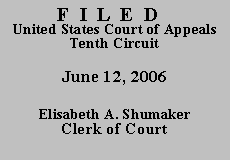

| UNITED STATES OF AMERICA,
Plaintiff-Appellee, v. JESUS MELENDEZ-MARTINEZ, Defendant-Appellant. |
|
BACKGROUND
The defendant was originally convicted in 2003, following the entry of an unconditional guilty plea, of one count of possession with intent to distribute more than five grams of methamphetamine, and one count of possession of a firearm by an unlawful user of a controlled substance. On appeal, this court reversed, holding that the plea was not knowing and voluntary because the defendant had been told by his attorney that he could raise the denial of his motion to suppress in a 28 U.S.C. § 2255 proceeding. The court also held that the defendant's right to allocution was denied by the district court. The court remanded for further proceedings. See United States v. Rodriguez-Gonzales, 386 F.3d 951 (10th Cir. 2004).
On remand the defendant again entered an unconditional guilty plea to the same two counts. The plea agreement contains a waiver of the right to appeal the sentence. In addition, the government agreed to recommend a two-level reduction under U.S.S.G. § 5K2.0 in exchange for an agreement by the defendant to waive his right to appeal the denial of his motion to suppress.
At sentencing, the government moved for the additional two-level reduction. This resulted in an advisory guideline sentence of 130 to 162 months. The defendant requested a further downward departure to the statutory minimum of 120 months. The district court granted the government's motion, but denied the defendant's request. The court imposed a sentence of 127 months, giving the defendant the benefit of three months he spent in state custody.
DISCUSSION
Defense counsel has filed a brief pursuant to Anders v. California, 386 U.S. 718 (1967), and has moved to withdraw as counsel, arguing that there are no non-frivolous arguments to raise on appeal. However, counsel does raise three possible issues: 1) that the district court erred in denying the defendant's motion to suppress; 2) that the plea was not knowing and voluntary; and 3) that the district court abused its discretion in imposing the 127 month sentence.
The defendant may not appeal the district court's denial of his motion to suppress because he entered an unconditional guilty plea. See United States v. Davis, 900 F.2d 1524, 1525-26 (10th Cir. 1990) (holding that defendant's guilty plea foreclosed his opportunity to challenge trial court's denial of motions to suppress; "[b]y entering a voluntary plea of guilty, [the defendant] waived all nonjurisdictional defenses").
As for the contention that the plea was not knowing and voluntary, we have reviewed the record, and determine that this argument is without merit. "A plea is valid if it represents a voluntary and intelligent choice among the alternatives open to the defendant." United States v. Gigley, 213 F.3d 509, 516 (10th Cir. 2000) (citation omitted). A review of both the Statement by Defendant in Advance of Plea of Guilty and the transcript of the plea hearing clearly indicates that the plea was knowing and voluntary. The Statement by Defendant in Advance of Plea of Guilty describes the statutory maximum penalties and informed the defendant about the rights he was waiving. The district court conducted a thorough inquiry at the plea hearing to ensure that the defendant's guilty plea was voluntary and knowing.
The third issue, that the district court abused its discretion in imposing a sentence of 120 months, is the subject of a motion to enforce the plea agreement filed by the government. We agree that the issue falls within the appellate waiver set out in the Statement by Defendant in Advance of Plea of Guilty and that the waiver is enforceable. See United States v. Hahn, 359 F.3d 1315, 1325 (10th Cir. 2004) ("the court of appeals, in reviewing appeals brought after a defendant has entered into an appeal waiver, determine[s]: (1) whether the disputed appeal falls within the scope of the waiver of appellate rights; (2) whether the defendant knowingly and voluntarily waived his appellate rights; and (3) whether enforcing the waiver would result in a miscarriage of justice as we define herein.").
Because the defendant has not shown any meritorious grounds for appeal, we GRANT defense counsel's request to withdraw and DISMISS the appeal. The government's motion to enforce the plea agreement is GRANTED. The defendant's motion for appointment of counsel is DENIED. The mandate shall issue forthwith.
Entered for the Court
PER CURIAM
*. This order and judgment is not binding precedent, except under the doctrines of law of the case, res judicata, and collateral estoppel. The court generally disfavors the citation of orders and judgments; nevertheless, an order and judgment may be cited under the terms and conditions of 10th Cir. R. 36.3.